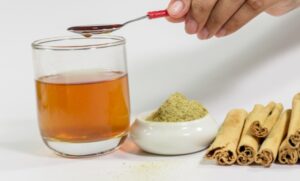Embarking on a journey towards managing polycystic ovary syndrome (PCOS) through natural treatments can be an empowering and transformative experience. PCOS, a common hormonal disorder affecting individuals with ovaries, often comes with a range of symptoms that can impact various aspects of life. While medical interventions exist, many individuals are exploring natural and holistic approaches to complement their overall well-being. In this blog, we’ll delve into effective and science-backed polycystic ovaries natural treatments that may help you regain balance and enhance your quality of life.
Contents
What Is The Importance Of Natural Treatment For PCOS?
 The importance of Polycystic Ovaries natural treatments lies in its holistic approach to managing the condition. While medical interventions certainly play a crucial role, incorporating natural treatments can offer several benefits:
The importance of Polycystic Ovaries natural treatments lies in its holistic approach to managing the condition. While medical interventions certainly play a crucial role, incorporating natural treatments can offer several benefits:
- Addressing Root Causes
Natural treatments often focus on addressing the underlying causes of PCOS, such as insulin resistance and hormonal imbalances. By targeting the root issues, these approaches aim for more sustainable and comprehensive management.
- Minimizing Side Effects
Unlike some pharmaceutical treatments that may come with side effects, natural remedies for PCOS are often associated with fewer adverse reactions. This can be particularly important for individuals who prefer gentler interventions or who may be sensitive to medications.
- Promoting Long-Term Wellness
Natural treatments, including lifestyle modifications and dietary changes, encourage overall well-being. By adopting healthier habits, individuals with PCOS can enhance their quality of life and manage symptoms more effectively. Ultimately, reduces the risk of associated health issues.
- Empowering Self-Management
Natural treatments empower individuals to take an active role in their health. Through lifestyle changes, dietary choices, and holistic practices, individuals can actively participate in their PCOS management, fostering a sense of control and self-efficacy.
- Balancing Hormones Naturally
Certain herbs, supplements, and lifestyle changes are believed to help regulate hormones associated with PCOS, such as insulin and androgens. This natural hormonal balance can positively impact various symptoms, including irregular menstrual cycles and skin-related issues.
- Reducing Dependence on Medications
While medications may be necessary for some aspects of PCOS management, natural treatments can complement medical interventions, potentially reducing the need for higher doses or additional medications.
It’s essential to note that the effectiveness of natural treatments may vary from person to person. And a comprehensive approach that combines natural and medical interventions may be the most beneficial.
What Are Some Polycystic Ovaries Natural Treatments?
 Polycystic ovaries natural treatments often focus on lifestyle modifications, dietary changes, and holistic approaches to address hormonal imbalances and associated symptoms. While individual responses can vary, here are some common natural treatments that may be considered:
Polycystic ovaries natural treatments often focus on lifestyle modifications, dietary changes, and holistic approaches to address hormonal imbalances and associated symptoms. While individual responses can vary, here are some common natural treatments that may be considered:
Dietary Modifications
Adopting a low glycemic index (GI) diet is a cornerstone of dietary management for PCOS. This involves choosing foods that have a slower impact on blood sugar levels, such as whole grains, legumes, and non-starchy vegetables. Balancing macronutrients—carbohydrates, proteins, and fats—is crucial. A diet rich in complex carbohydrates, lean proteins (like fish and poultry), and healthy fats (such as avocados and nuts) can help regulate insulin and blood sugar levels.
Regular Exercise
Engaging in regular physical activity is fundamental for managing PCOS. Both aerobic exercises (such as walking, jogging, or cycling) and strength training contribute to improved insulin sensitivity and weight management. Exercise helps regulate menstrual cycles, reduce inflammation, and enhance overall well-being. Aim for at least 150 minutes of moderate-intensity exercise per week, as recommended by health guidelines.
Weight Management
Maintaining a healthy weight is crucial for women with PCOS, as excess body weight can exacerbate insulin resistance and hormonal imbalances. A combination of a balanced diet and regular exercise contributes to weight management. Even a modest weight loss of 5-10% of body weight can have significant positive effects on PCOS symptoms, including improved ovulation and fertility.
Herbal Supplements
Spearmint tea is gaining attention for its potential to reduce hirsutism (excessive hair growth) in women with PCOS. Drinking this herbal tea regularly may help manage symptoms related to elevated androgens. Additionally, Vitex Agnus-Castus, commonly known as Chaste Tree, has been traditionally used to regulate menstrual cycles and balance hormones. While individual responses vary, consulting with a healthcare professional before incorporating herbal supplements is advisable.
Inositol Supplements
Inositol, specifically myo-inositol, is a naturally occurring compound that belongs to the B-vitamin family. Studies suggest that inositol supplementation may improve insulin sensitivity and regulate menstrual cycles in women with PCOS. It is available in supplement form, and healthcare professionals may recommend specific dosages based on individual needs. As with any supplement, it’s important to discuss its use with a healthcare provider to ensure safety and effectiveness.
Omega-3 Fatty Acids
Incorporating omega-3 fatty acids into the diet is a beneficial strategy for managing PCOS. Sources include fatty fish (such as salmon and mackerel), flaxseeds, and walnuts. Omega-3s have anti-inflammatory properties that can help alleviate inflammation associated with PCOS. Additionally, these fatty acids may contribute to improving lipid profiles, promoting cardiovascular health, and positively influencing hormonal balance.
Mind-Body Practices
Mind-body practices, including yoga and meditation, play a crucial role in managing stress, which is particularly important for individuals with PCOS. Chronic stress can contribute to hormonal imbalances and exacerbate symptoms. Yoga, with its combination of physical postures, breath control, and meditation, has been shown to reduce stress levels and improve overall well-being. Similarly, mindfulness meditation techniques can help individuals cope with stress and promote emotional balance.
Acupuncture
Acupuncture is a traditional Chinese medicine practice that involves inserting thin needles into specific points on the body. Some studies suggest that acupuncture may help regulate menstrual cycles and reduce symptoms associated with PCOS. It is believed to influence the flow of energy (Qi) in the body and promote hormonal balance. While more research is needed, acupuncture is considered a safe and well-tolerated complementary therapy for PCOS.
Probiotics
The gut microbiome plays a significant role in overall health, including hormonal balance. Probiotics are beneficial bacteria that support a healthy gut environment. Including probiotic-rich foods such as yogurt, kefir, sauerkraut, and kimchi in the diet can positively impact gut health. Probiotic supplements may also be considered, particularly if there are signs of gut dysbiosis. Maintaining a healthy gut can contribute to reduced inflammation and improved insulin sensitivity in individuals with PCOS.
Limiting Endocrine Disruptors
Endocrine-disrupting chemicals found in certain plastics, pesticides, and personal care products can interfere with hormonal balance. Limiting exposure to these substances is essential. Choose glass or stainless steel containers for food and beverages, opt for organic produce to reduce pesticide exposure, and choose personal care products that are free from potentially harmful chemicals. These measures help reduce the body’s burden of endocrine-disrupting compounds, supporting hormonal balance in individuals with PCOS.
Incorporating these polycystic ovaries natural treatments into a comprehensive management plan requires a personalized approach. Consultation with healthcare professionals is crucial to ensure that these strategies align with individual health needs and goals.
Which Fruits To Avoid In PCOS?
 While fruits are generally a healthy part of a balanced diet, some fruits are higher in sugar and may have a more significant impact on blood sugar levels. It’s important to note that individual responses to specific fruits can vary, and moderation is key. Here are some fruits that individuals with PCOS may consider consuming in moderation or monitoring their intake:
While fruits are generally a healthy part of a balanced diet, some fruits are higher in sugar and may have a more significant impact on blood sugar levels. It’s important to note that individual responses to specific fruits can vary, and moderation is key. Here are some fruits that individuals with PCOS may consider consuming in moderation or monitoring their intake:
- High-Glycemic Fruits
Fruits with a high glycemic index can cause a rapid spike in blood sugar levels. Examples include watermelon, ripe bananas, and pineapple. While these fruits can be enjoyed occasionally, it’s advisable to balance them with lower glycemic options to help manage blood sugar levels.
- Dried Fruits
Dried fruits, such as raisins, dates, and dried apricots, are concentrated sources of sugar. The drying process removes water content, making them higher in sugar and calories. It’s advisable to consume dried fruits in small portions and consider them as occasional treats.
- Canned Fruits in Syrup
Fruits canned in syrup often contain added sugars, contributing to higher overall sugar content. Opt for fruits canned in natural juices or, even better, choose fresh or frozen fruits without added sugars.
- Juices and Smoothies
Fruit juices and smoothies, even if homemade, can be high in sugars and lack the fiber found in whole fruits. Consuming whole fruits is generally preferable to drinking fruit juices or smoothies, as the fiber helps slow down the absorption of sugars.
- Large Quantities of Sweet Fruits
While fruits like berries, cherries, and apples are generally considered healthy, consuming them in excessively large quantities may contribute to higher sugar intake. Moderation is key, and pairing fruits with protein or healthy fats can help mitigate their impact on blood sugar levels.
It’s essential to emphasize that fruits are a rich source of essential nutrients, fiber, and antioxidants. Thus, they can be part of a well-balanced diet. Instead of completely avoiding certain fruits, individuals with PCOS may benefit from focusing on a diverse range of fruits. Hence, especially those with lower glycemic indexes, such as berries, cherries, and grapefruit.
Conclusion
In conclusion, embracing Polycystic Ovaries natural treatments offers a holistic and empowering approach to managing this hormonal disorder. By incorporating lifestyle modifications, such as a balanced diet, regular exercise, and stress-reducing practices, individuals with PCOS can address underlying causes and improve overall well-being. Herbal supplements, mindful practices like yoga, and maintaining a healthy gut with probiotics contribute to hormonal balance.
While natural treatments may not replace medical interventions, they can complement traditional approaches, providing a personalized and sustainable path to PCOS management. It’s crucial to consult with healthcare professionals for guidance. If you are facing PCOS-related issues, PCOS treatment at HerMantra can help. Book your free trial online pcos treatment session now.


